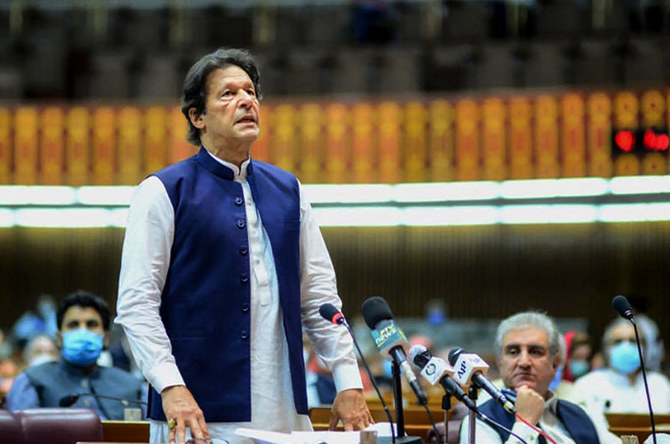ISLAMABAD: Prime Minister Imran Khan will seek a vote of confidence from parliament on Saturday as the opposition Pakistan Democratic Movement alliance calls for his resignation and demands fresh elections in the country following the defeat of finance minister Abdul Hafeez Shaikh in a high-stakes Senate contest from Islamabad on Wednesday.
“We are hundred percent sure that Prime Minister Imran Khan will succeed in getting the vote of confidence from the National Assembly,” Lal Chand, a parliamentary secretary for human rights, told Arab News on Thursday.
Explaining the process, he said the confidence vote would take place in the 342-member National Assembly by counting the number of legislators for and against the motion. “This will be an open vote, and no buying of any member or horse-trading will be possible for the opposition,” Chand said.
As per the constitution, the prime minister is required to secure at least 172 votes to retain his position. The parliamentary secretary, however, claimed that Khan would get more than 181 votes on Saturday.
Khan’s Pakistan Tehreek-e-Insaf (PTI) party won the 2018 general elections but failed to get 172 seats to form the government on its own. It cobbled together a coalition with help of smaller parliamentary parties like Muttahida Qaumi Movement-Pakistan, Balochistan Awami Party and Pakistan Muslim League. The PTI has 157 seats in the National Assembly.
An opposition politician Yousuf Raza Gilani defeated the finance minister Abdul Hafeez Shaikh on Wednesday after securing 169 votes. Gilani’s success suggested that some ruling party lawmakers had revolted against the PTI by not voting for Shaikh, analysts said.
“If the prime minister fails to get the vote of confidence on Saturday, he will automatically cease to hold office as per the constitution,” Muddassir Rizvi, who works with the Free and Fair Election Network, told Arab News.
He described the government’s decision to seek the vote of confidence as a “healthy move” that would help strengthen democratic process in the country.
Rizvi added that members of parliamentary parties who voted against the party line would face disqualification from their seat.
“A lawmaker can contest the election again after getting disqualified under the defection clause of the constitution as this penalty doesn’t apply for life,” he explained.
The opposition earlier in the day demanded the prime minister to resign and called for fresh elections in the country, saying that the PTI administration had lost the majority in the house.
“New elections are the only solution to come out of the current political and economic crisis,” Shahid Khaqan Abbasi, former prime minister and senior Pakistan Muslim League-Nawaz leader, said while addressing a press conference along with other opposition members.
About the prime minister’s vote of confidence, he said: “The time for fake vote of confidence and management of the assembly through intimidation is over.”
Rasul Bakhsh Rais, a professor of political science at LUMS, admitted that the opposition had succeeded in destabilizing the government through the Senate seat victory in Islamabad, though he added that such political setbacks were part of the democratic process.
“It is a daring decision on part of the prime minister to seek vote of confidence from parliament, but it may lead to another setback if he fails to get the required number of votes,” he told Arab News.
















